GOVERNMENT
OF ANDHRA PRADESH
FINANCE
& PLANNING (F.W. - F.R.-1) DEPARTMENT
Cir.Memo
No.C-9101-4/8/FR.I/91 Dated.
25-12-91
Sub: Unauthorised
absence - Wilful and prolonged absence from duty without proper leave - Further
instructions - Issued.
In
Circular Memo No.4481/A/128/FR.l/88, Fin. &.Pig. (Fin. Wing. FRI) Dept.
dated 7-7-1988 Government have issued instructions ordering concerned
departmental authorities to initiate disciplinary action against those
employees who remained absent from duty without proper leave and pass
appropriate orders on the basis
or the disciplinary proceedings by following the procedure laid down in
A.P.C.S. (C.C.A) Rules, 1963 read with instructions in Appendix-VI to the said
rules. In-spite of those
instructions number of cases are being referred to Finance Department for
clarification on some of the following questions:
(i) Whether a
member of service who remained absent from duty without proper leave can be
permitted to join duty if he gives joining report pending further action to
determine or regulate the period of absence by taking disciplinary action or
otherwise:
(ii) Whether the
resignation tendered or request for voluntary retirement made by a member of
service who has remained absent without proper leave can be accepted without
determination of the period of unauthorised absence.
In
view of this a need is felt for issuing further instructions in the matter as
guidelines in continuation of the instructions issued in the Circular Memo
afore mentioned.
2. According to FR.
18, and rule 5-A of the A.P. Leave Rules, 1933 and the Note-I thereunder, no
Government servant should be granted leave of any kind for a period exceeding
live years and that wilful absence from duty not covered by grant of any leave
shall be treated as 'dies-non- for all purposes viz. increments, leave and
pension.
3. Neither FR. 18
nor Rule 5 of the A.P. Leave Rules, can be construed to mean:
(a) that the
member of service who remains absent from duty without proper leave cannot be
permitted to join duty if he gives a joining report; or
(b) that such
member of service ceases to be in service by such absence so as to discharge
him from service in terms of FR. 18.
What
therefore follows from this is that if a member of service who remains absent
without any leave gives a joining report it should be ensured by the competent
authority that he is permitted to join immediately pending initiation of the
disciplinary action for unauthorised absence, in case such action has already
not been initiated against him and in all such cases the period of unauthorised
absence has to be treated as ‘dies-non’ in accordance with the Notes-1 under
F.R.18 and Rule 5-A aforesaid. This treatment of unauthorised absence as 'dies non’
is distinct from disciplinary action taken or to be 'taken against the
employees concerned.
4.
Action against regular employees:
What
F.R.8 and Rule 5 of the A.P. Leave Rules mandates is that no member of service
shall he granted leave of any kind for a continuous period exceeding five years
without the specific approval or Govt. No inference can be drawn from these
rules that disciplinary action against a member of service cannot be taken
unless he is continuously absent for more than five years without any leave. It
is therefore clarified that it is not at all necessary for the authority
competent to initiate disciplinary action to wait for a period of five years to
initiate disciplinary action against the member of service for his absence from
duty wilfully or unauthorisedly. In all such cases the disciplinary proceedings
can be initiated against such member or service who remained absent without any
leave straight away by following the procedure laid down in Rule 19 (2) of the
A.P.C.S. (C.C.A) Rules. 1963 read with instructions 5 (c) (iv) of instructions
in Appendix-VI to the said rules for unauthorised absence without leave which
constitutes good and sufficient reason for initiating disciplinary action under
the said rules and such other misconduct as having secured gainful employment elsewhere
during his absence from duty without leave. In all such cases the enquiry officer
has to be decided to complete the enquiry within a fixed time say within a period
of 1-2 months. The charges framed against the employee concerned should be
communicated by Registered Post Acknowledgement due. If however the employee is
not available at the last address given by him the Charge Memo should be got
published in the Andhra Pradesh Gazette and enquiry should be conducted exparte
for taking necessary action against him. Even in such cases where an employee
reports hack to duty he should be permitted to join duty without prejudice to
the action contemplated or pending against him. If the employee applies for
leave on medical grounds along with the joining report and extends leave on the
same grounds beyond three months, he should be referred to Medical Board for
examination and necessary action may be taken against him on the basis of the
medical report.
5.
Temporary Employees:
According
to the note under Rule 6-A of A.P. Leave Rules, read with proviso to FR. 73, a
temporary Government servant working under emergency provisions who remains
absent from duty after applying for leave or extension of leave to which he is
not entitled to under the Rules shall be deemed to have been discharged from
duty with effect from the date from which he is not entitled to any leave
unless the leave applied for is granted in relaxation of relevant rules. Where
such a temporary employee, absents himself unauthorisedly or without sufficient
justification. Action should be taken immediately for discharging him from service
invoking this rule, by issuing an innocuous order indicating the provisions, under
which the employee stands discharged.
6.
Request for "Resignation"
while absent unauthorisedly:
Resignation
by a member or a service is governed by general Rule 39. General Rule 39 which is,
relevant for the purpose reads as follows:
"39.
Resignation"
(a)
A member of a service may resign his appointment and the acceptance or his
resignation by the appointing authority shall take effect:
(i) in case he is
on duty, from the date on which he is relieved or his duties in pursuance or
such acceptance:
(ii) in case he is
on leave, from the date of communication of such acceptance lo the member or if
the said authority so directs from the date or expiry of leave; and
(iii) in any other
case, from the date of communication of such acceptance to the member of from
such other date, not being earlier than the date on which he was last on duty,
as the said authority may, having regard to administrative exigencies. Specify:
Provided that a
resignation of a member of a service, who is placed under suspension from
service pending investigation or enquiry into grave charges or who is deemed to
have been suspended under rule 13 of the Andhra Pradesh Civil Services
(Classification, Control and Appeal) Rules. 1963, shall not be accepted during
the period of such suspension: and
Provided further
that no withdrawal of resignation shall be permitted except with the sanction
of the Government after the date of its actual acceptance by the appointing
authority.
(b)
A member of a service shall, if
he resigns his appointment, forfeit not only the service rendered by him in the
particular post held by him at the time of resignation but all his previous
service under the Government."
The
consequence of the resignation as laid down in General Rule 39(b) is that not
only the service rendered by the member of service in a particular post held by
him at the time of resignation but also all his previous service under the
Government will stand forfeited. In view of this consequence the regulation of
the period of unauthorised absence would be of no consequence an9 the.
acceptance of such resignation tendered by the member of service who remained
absent from duty without leave need not wait the determination of unauthorised
absence.
Request
for "Voluntary Retirement" while absent unauthorisedly: Instances
have also come to notice where Government servants, while being unauthorisedly
absent or where their leave was refused, have sought for voluntary retirement
on completion of 20/33 years of qualifying service in accordance with Rules 41
and 44 of Revised Pension Rules, 1980, respectively, the competent authorities
concerned have failed to take action to accept them promptly, resulting in
unintended benefit lo the employees concerned. In case of retirement on
completion of 20 years or qualifying service as provided under Rule 43 of
Revised Pension Rules, 1980, a Government servant who gives a notice in writing
of his intention to retire voluntarily shall not retire unless the notice given
by him is accepted by the competent authority, provided that the competent
authority shall issue an order before the expiry of the notice period accepting
or rejecting the notice. In case of voluntary retirement on completion of 33
years of qualifying service as provided under Rule 44 of Revised Pension Rules,
1980, the appointing authority has lo issue orders permitting the Government
servant to retire from service. In normal course, in either case, the voluntary
retirement can be accepted / permitted as the case may he. pending
determination of the period of unauthorised absence. In cases where it is contemplated to take
disciplinary action against the employee concerned, it would be appropriate to
frame a charge against him before he retires from service so that further action
may be pursued in accordance with Rule 9 of Revised Pension Rules unless the
charges are grave and acceptance of such notice would not be in public
interest. As such, acceptance of notice of voluntary retirement need not await
the determination of the period of absence, provided the Government servant
concerned has rendered 20/33 years of qualifying service.
Even
in cases where an
employee is permitted to retire voluntarily, departmental proceedings can be
instituted with the sanction of Government in respect of a cause of action
which arose or an event which took place not more than four years before such
institution, in terms of Rule 9 of Revised Pension Rules.
The
Departments of Secretariat and all the Heads of Departments are therefore,
requested to keep these guidelines in view while dealing with cases of
unauthorised absence, and to communicate them for implementation by their
Subordinate Officers who may be appointing authorities of posts. the holders of
which may attract the provisions of rules referred to in these guidelines.
S.
SANTHANAM
Special
Chief Secretary to Government














